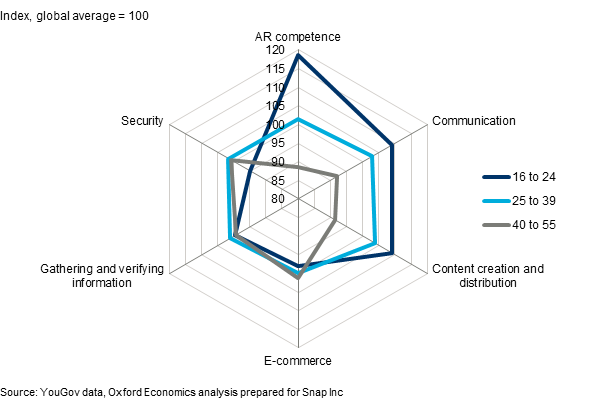By Morgan Rooney, Assistant Economist, Economic Impact, Oxford Economics
Originally published by Oxford Economics
As the world population approaches 8 billion, over a quarter belong to Generation Z (those born between 1997 and 2012). Whilst their impact to both the economy and society is currently limited by their youth, this massive cohort is now joining the workforce. Their distinct priorities, skills, and characteristics will pose a challenge to companies – both as employees and consumers.
As our report with Snap Inc based on data from a group of OECD countries shows, this new generation’s impact will only become more pronounced. By 2030, they will:
- make up almost one-third of the workforce;
- see their disposable incomes increase almost sevenfold; and
- increase their consumer spending more than sixfold.
A defining priority of Gen Z is their commitment to sustainability, being often recognised as the generation most conscious of the issue. Research shows a third of Gen Zers in the US had taken at least one of four actions in 2020-21: donating money, contacting an elected official, volunteering, or attending a rally to help address climate change in the past year – more than any other generation.
Gen Zers are also demanding similar behavioural changes from their employers, as well as the firms supplying their purchases. As consumers, they are willing to spend 10% more on sustainable products – three quarters of the generation state that sustainability is more important to them than brand names. As workers, they want to work for – and will remain longer with – authentically sustainable employers. According to a Deloitte study, 77% of Gen Z respondents said it was important to work at organisations whose values aligned with theirs, and 59% of 18–22-year-olds surveyed by Bupa stated they would remain longer with responsible employers.
However, Gen Zers aren’t just placing these demands on others – they have unique skills that make them ideally placed to push meaningful progress towards the issue themselves. Our research shows a characteristic Gen Zer is more:
- agile – with an enhanced ability to absorb information and react to new challenges;
- creative – particularly with digital; and
- curious – making them particularly open to engaging in various forms of learning.
Having typically grown up with technology their entire lives, Gen Zers are the first wholly digitally native generation.

Digital competence score by age cohort: global sample
These characteristics put them in a strong position to make the most of the opportunities associated with the so-called Green Economy and effectively implement the UN’s Action Plan for a Sustainable Planet in the Digital Age – particularly to “harness the power of digital innovation in mitigating environmental degradation.” There is already evidence of the generation using its unique skills to this end: #FridaysForFuture is a youth-led organised global strike movement inspired by perhaps the most famous Gen Z activist, Greta Thunberg, which now involves over 14 million people across 7,500 cities.
Businesses need to recognise the changing demands of those who will work for them and serve as their customers. As our joint report with Arup showed, those that adapt now and invest in the Green Economy could benefit from significant first-mover advantages by capturing larger shares of these markets. Indeed, the report showed that these opportunities are huge: The transition to net zero emissions is estimated to be worth $10.3 trillion to the global economy by 2050.
The views and opinions expressed by blog authors are those of the authors and do not necessarily reflect the official policy or position of the Center for Exhibition Industry Research. Any content provided by our bloggers or authors are of their opinion. All content provided on this blog is for informational purposes only. CEIR makes no representations as to the accuracy or completeness of any information on this site or found by following any link on this site. CEIR will not be liable for any errors or omissions in this information nor for the availability of this information.
